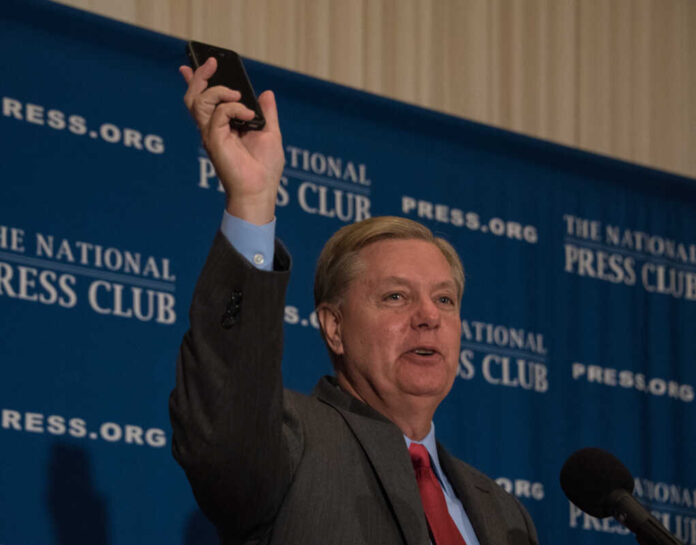
Senator Lindsey Graham is spearheading a bipartisan push to impose severe sanctions on Russia, contrasting with President Donald Trump’s more cautious approach.
At a Glance
- Senator Lindsey Graham leads a bipartisan effort to impose 500% tariffs on countries importing Russian energy.
- The proposed sanctions aim to pressure nations like China and India, major consumers of Russian oil and gas.
- President Trump has yet to endorse the sanctions, expressing uncertainty about their implementation.
- Ukraine’s recent drone attacks have significantly damaged Russian military assets, escalating tensions.
- European leaders, including Emmanuel Macron and Ursula von der Leyen, support the U.S. Senate’s sanctions initiative.
Strategic Pivot
In response to Russia’s ongoing aggression in Ukraine, Senator Lindsey Graham, joined by Democrat Richard Blumenthal, introduced the Sanctioning Russia Act of 2025. The bill proposes a 500% tariff on nations that continue importing Russian oil, gas, or uranium—targeting Russia’s top energy clients like China and India. With 81 Senate co-sponsors, the proposal enjoys overwhelming bipartisan support and represents one of the most aggressive economic measures against Russia to date, as detailed in The Daily Beast’s original report.
Graham emphasized the urgency, warning that Putin’s war crimes require a robust international response. The strategy is aimed at increasing the cost of doing business with Russia to cripple its wartime economy. As outlined in Politico’s coverage of bipartisan Senate talks in Paris, lawmakers are coordinating with European leaders to ensure transatlantic alignment on punitive measures.
Watch a report: Graham Leads GOP Push to Punish Putin.
Risk and Opportunity
President Trump, despite calling Vladimir Putin “absolutely crazy” in a recent statement, has not endorsed the Graham-Blumenthal bill. According to The Daily Beast, Trump’s ambiguity has drawn criticism from within his own party, which increasingly sees the sanctions as a necessary response to escalating atrocities in Ukraine.
Meanwhile, Ukraine’s Operation Spider-Web—a coordinated drone assault on Russian airbases—has destroyed strategic bombers and radar infrastructure. As reported in The Daily Beast’s analysis, the operation marks a turning point in the war and underscores the strategic necessity of further weakening Russia’s logistical capabilities.
European support remains firm. After joint meetings in Paris, both French President Emmanuel Macron and European Commission President Ursula von der Leyen affirmed their commitment to sanctions. According to Politico, their backing signals rare unity in pressuring non-aligned nations to halt energy imports from Moscow.
The next few weeks will be critical as Congress debates the sanctions bill and the White House weighs its next move. If passed, the legislation would represent one of the most forceful economic actions by the U.S. against Russia since the start of the war, marking a pivotal moment in the broader geopolitical contest between autocracy and democratic solidarity.





























